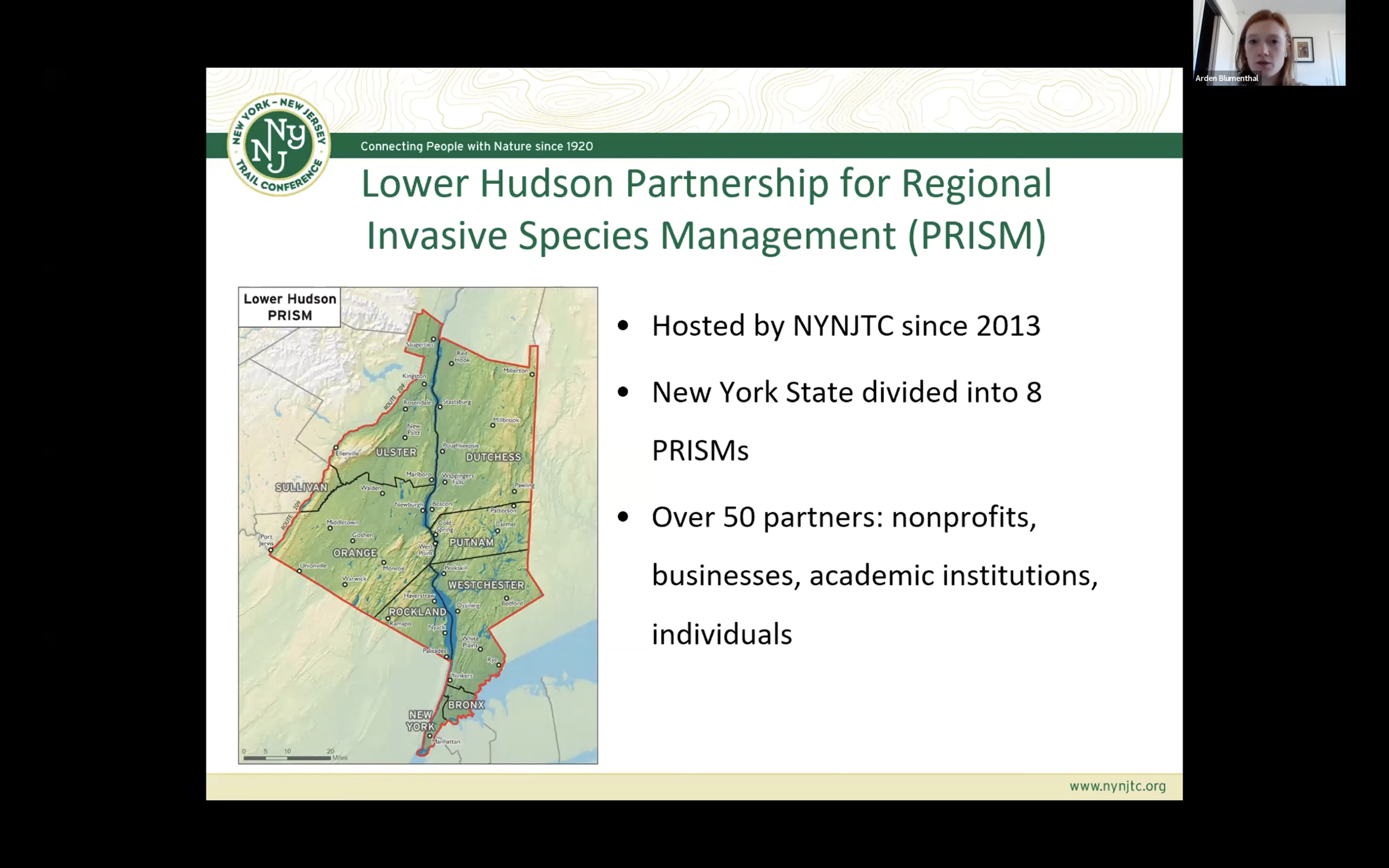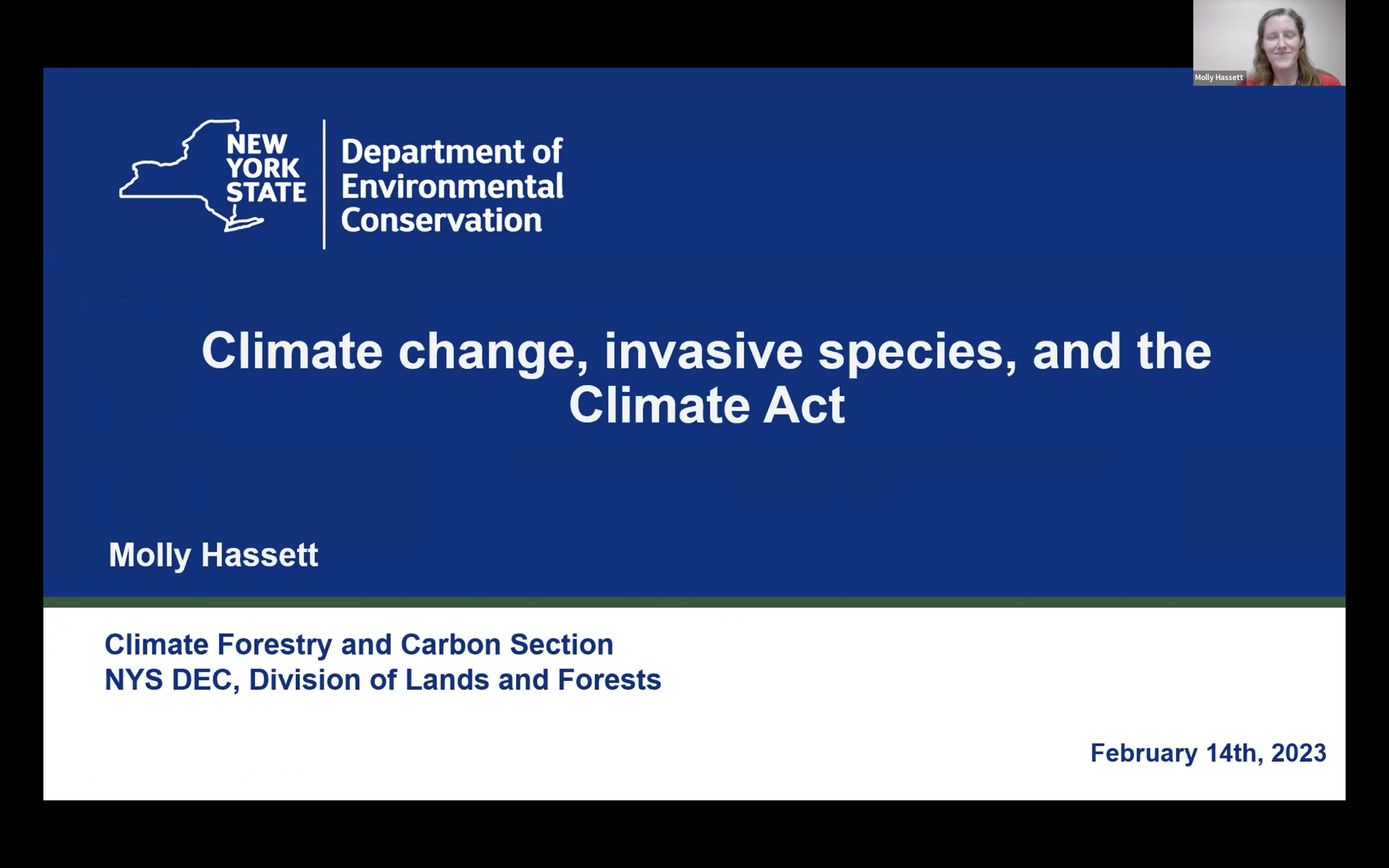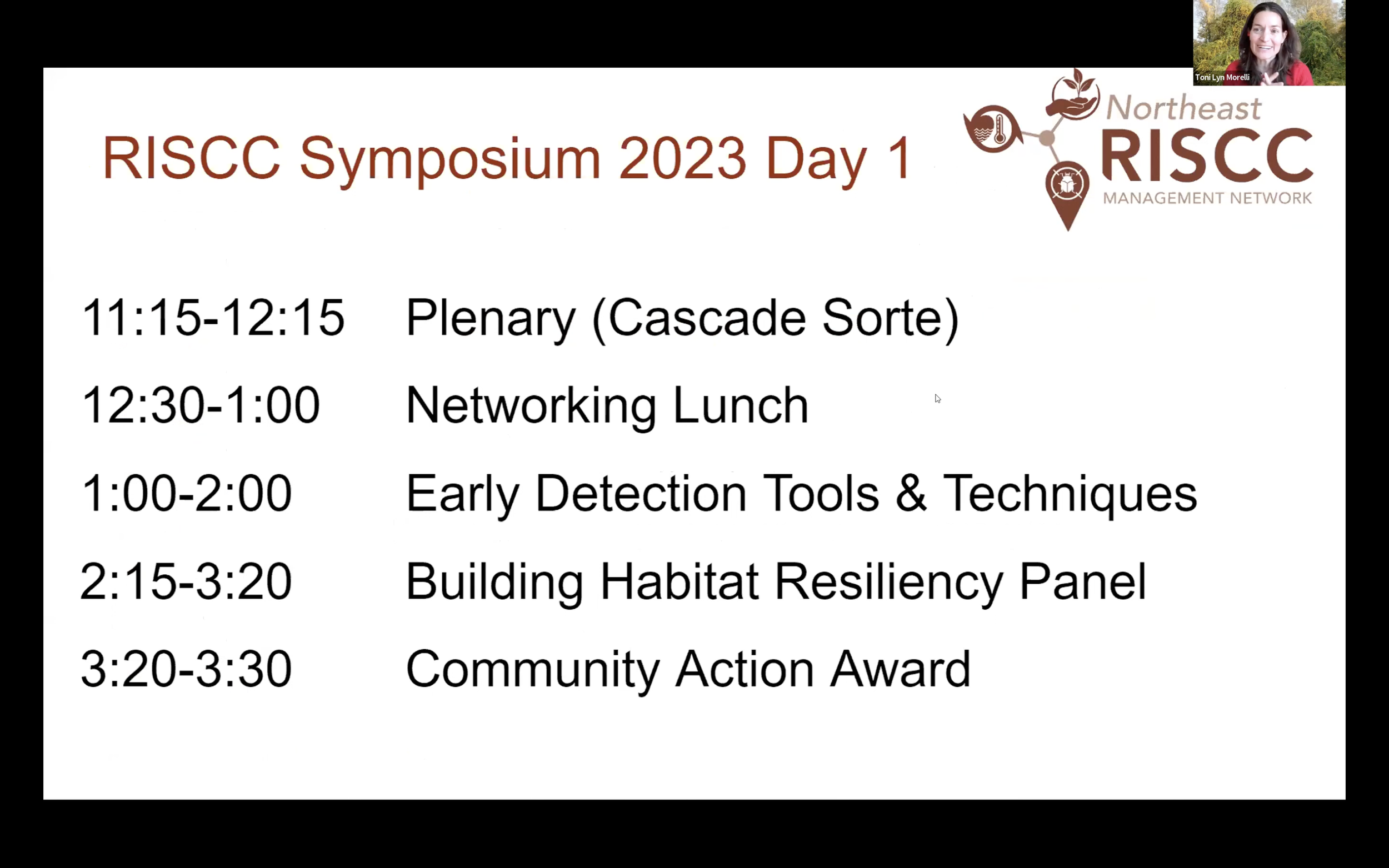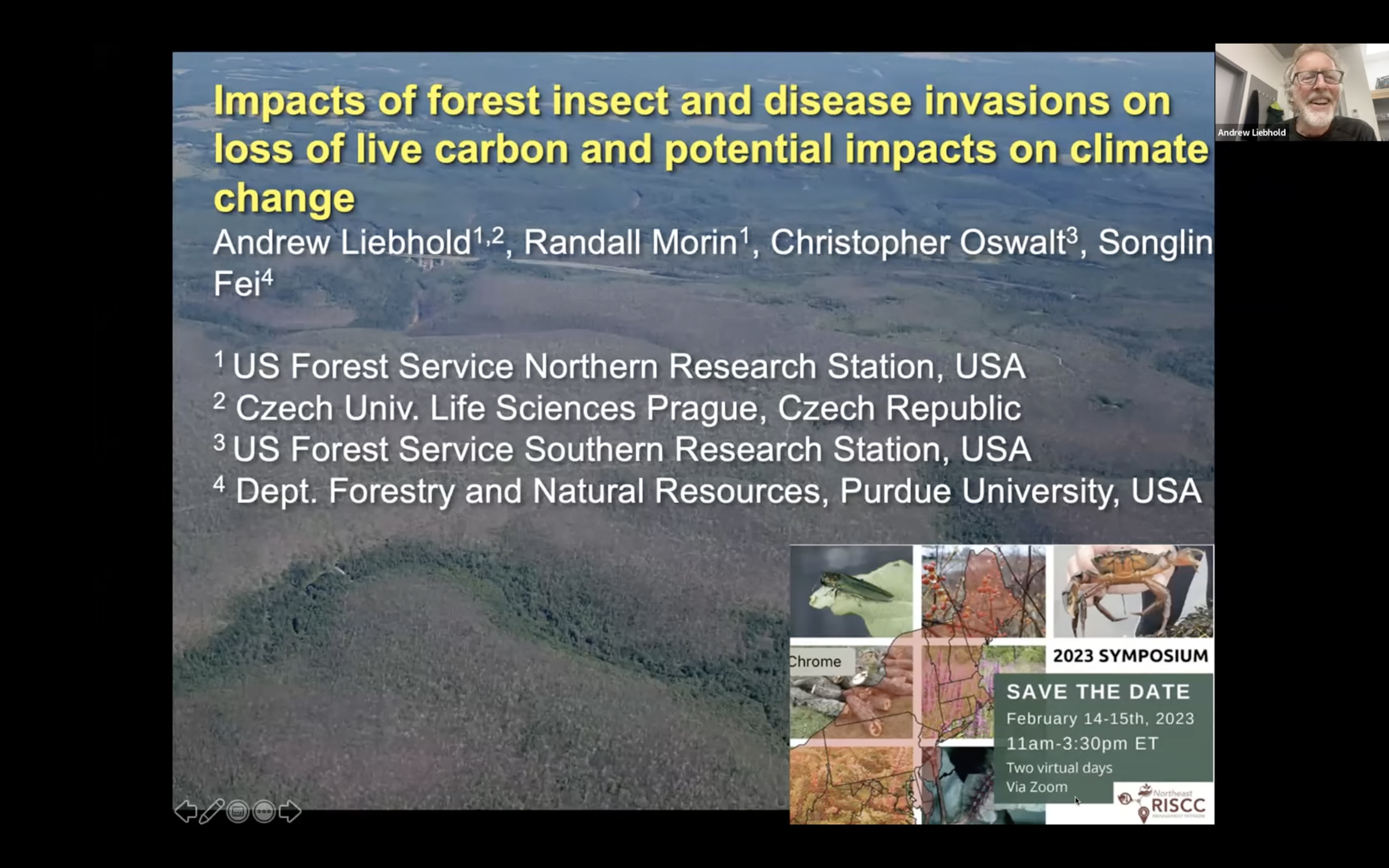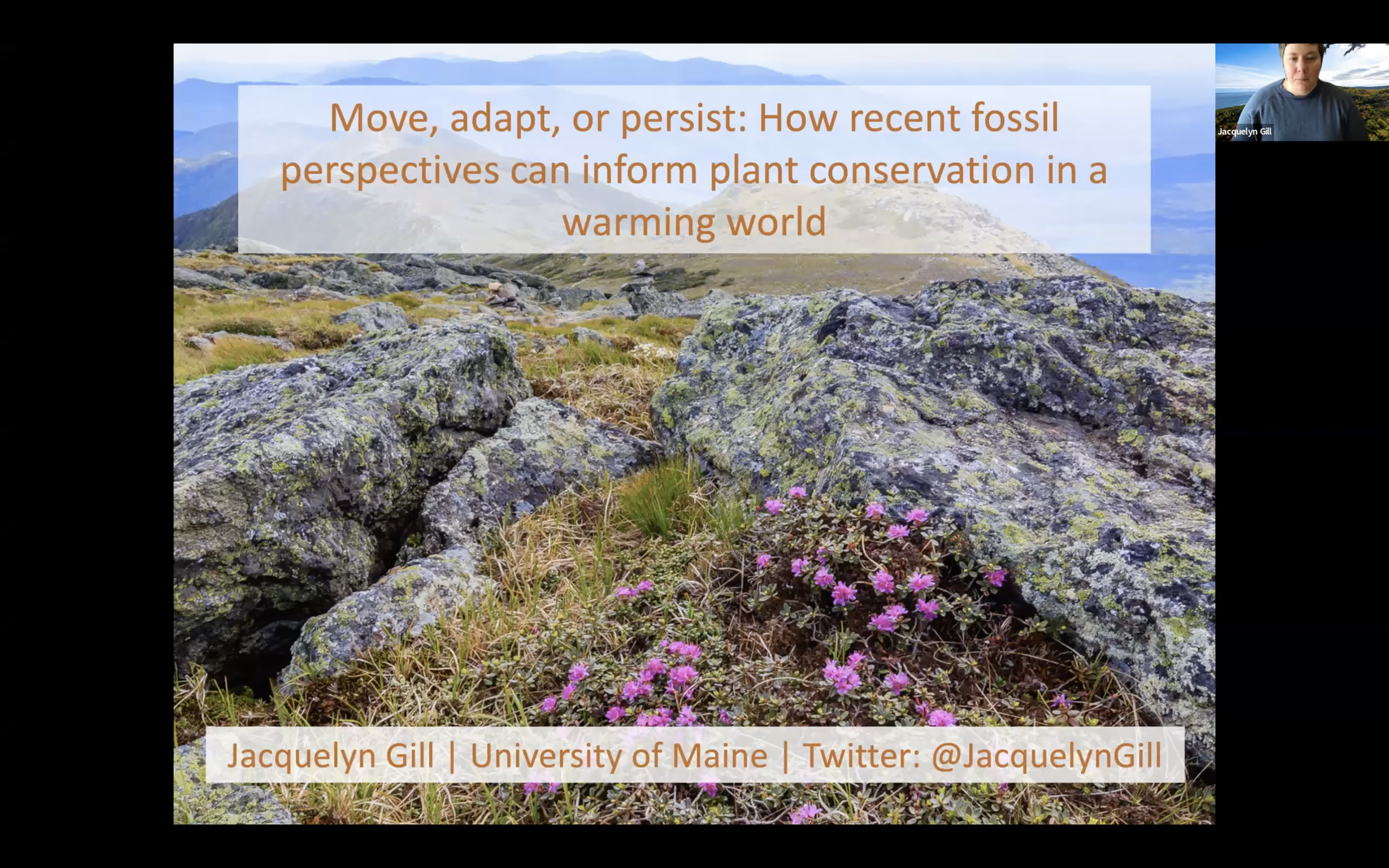6th Annual RISCC Management Symposium
Presentation recordings are also available on our YouTube channel!
Bethany Bradley (UMass Amherst) welcomes participants to the 2023 symposium of the RISCC Management network.
Presentation Session 1: Early Detection Tools & Techniques
Moderated by Annette Evans (UMass Amherst), the first presentation session featured the following speakers:
Arden Blumenthal (NYNJ Trail Conference), "Early Detection of Invasive Species in the Lower Hudson Using Conservation Detection Dogs"
Tonya Bittner (NYS Hemlock Initiative), "Utility of eDNA Analysis for Early Detection and Monitoring of Hemlock Woolly Adelgid (HWA) and Biological Control Insects"
Sean Duffey (Massachusetts Office of Coastal Zone Management), "Monitoring Marine Invasive Species in New England"
Wes Daniel (USGS Wetland and Aquatic Research Center), “Future Aquatic Invaders of the Northeast U.S.: How Climate Change, Human Vectors, and Natural History Could Bring Southern and Western Species North”
Panel Session 1: Building Habitat Resiliency in a Changing Climate
Moderated by Matt Brincka (NY State Office of Parks), the first panel session featured the following speakers:
Molly Hassett (NYS DEC - Climate Forestry & Carbon Section), "Climate Change, Forest Pests, and Carbon Impacts on Forest Management"
Sarah Bois (Linda Loring Nature Foundation), "Invasive Pine Management to Restore Sandplain Grasslands; Increasing Resilience of a Globally Rare Habitat"
Robert Smith (TNC - SLELO PRISM), "Encouraging Climate-Resilient Forests Through Restoration"
Dave Spiering (NYS Parks & Historic Site), "Coastal Wetlands and Shoreline Restoration"
Presented by Ayodele O’uhuru (UMass Amherst), to recognize:
Bobbi Wilson (Caldwell, NJ) for passion and leadership in improving the community of support for invasive species action in a changing climate
Workshop: Culturally Important Species: Lessons in Protecting Brown Ash in Wabanakik
Moderated by Marissa Weiss (USGS NE CASC), this workshop covered the cultural importance of brown ash, current research on management, the importance of seed collection, and insights learned from organizing a cross-cultural collaboration to protect brown ash, featuring the following speakers:
John Daigle (University of Maine)
Tyler Everett (University of Maine)
Emily Francis (University of Maine)
Ella McDonald (University of Maine)
Presentation Session 2: Forest Invasives and Climate Change
Moderated by Caroline Marschner (Cornell University), the second presentation session featured the following speakers:
Gary Fish (Maine Dept. of Agriculture, Conservation, and Forestry), "Is Climate Change Affecting Invasive Forest Pest Ranges in Maine?"
Emma Hudgins (Carleton University), "Invasive Forest Pest Impacts and Mitigation Tactics for Urban Wellbeing in a Changing Climate"
Andrew Liebhold (U.S. Forest Service), "Impacts of Forest Insect and Disease Invasions on Loss of Live Carbon and Potential Impacts on Climate Change"
Dustin Bronson (Northern Institute of Applied Climate Science), "Restoration of Lowland Ash When Considering Climate Change: Evaluation of 23 Potential Tree Species for Enriching Planting"
Panel Session 2: Managed Relocation as a Restoration Tool
Moderated by Jenica Allen (UMass Amherst), Audrey Barker Plotkin (UMass Amherst & Harvard Forest), Caroline Marschner (Cornell University), the second panel session featured the following speakers:
Jacquelyn Gill (University of Maine), “Move, Adapt, Persist: How Recent Fossil Perspectives Can Inform Plant Conservation in a Warming World
Mark Schwartz (University of California Davis), “Whose Decision is Assisted Migration and How Should They Decide?”
Peter Clark (University of Vermont), “Opportunities and Barriers for Operationalizing Assisted Migration in Northern Forests”
Moderated by Audrey Barker Plotkin (UMass Amherst & Harvard Forest), the final presentation session provided research updates from the following RISCC leadership team members:
Annette Evans (UMass Amherst & USGS NECASC), "Biocontrol in a Changing Climate"
Aly Putnam (PhD Candidate, UMass Amherst), "Impact Assessment of Marine Range Shifting Invertebrates and Algae"
Dan Buonaiuto (Postdoctoral Research Associate, UMass Amherst), "Can Evolutionary History Help us Anticipate New Invaders?"
Matt Fertakos (PhD Candidate, UMass Amherst), “Creating a Climate Smart Horticultural Industry
Toni Lyn Morelli (USGS NE CASC), “Invasive Species and Climate Change Management Networks: Spreading Across the Country”
Jenica Allen (UMass Amherst) wraps up the 6th annual RISCC symposium with closing remarks.



